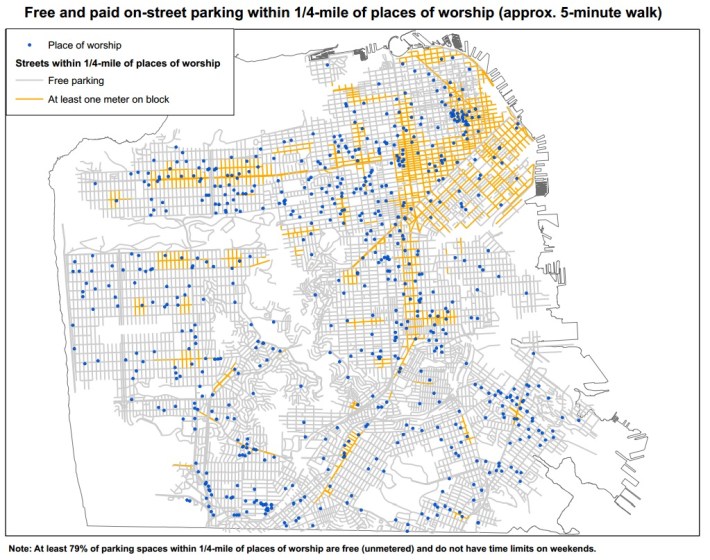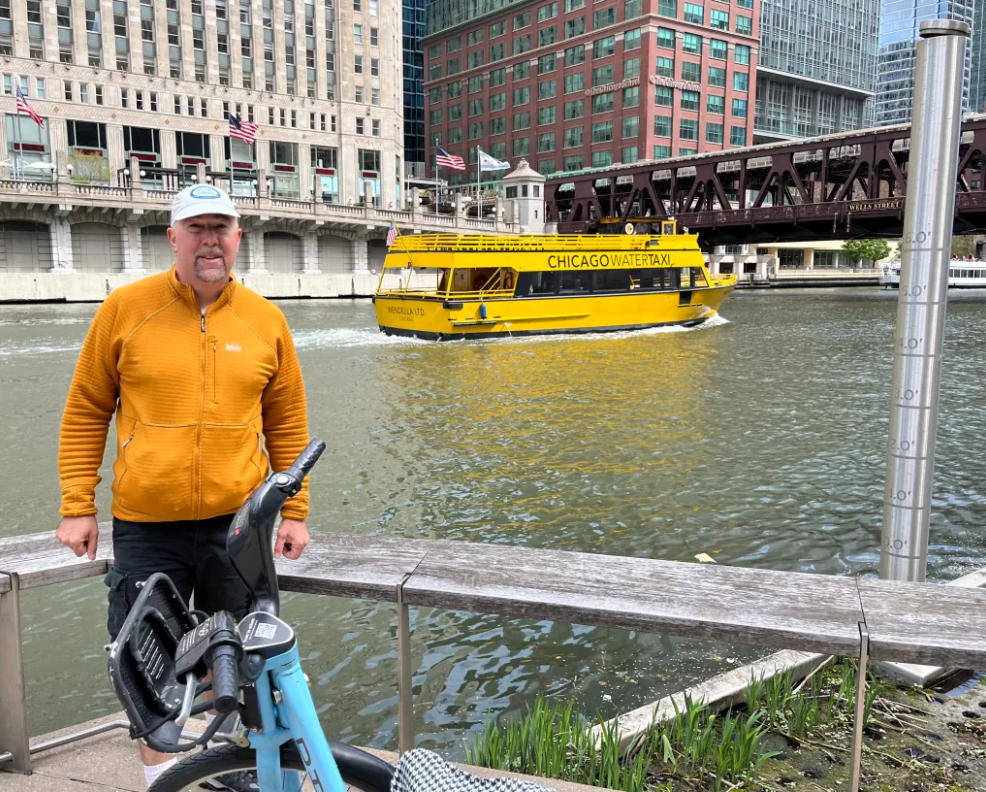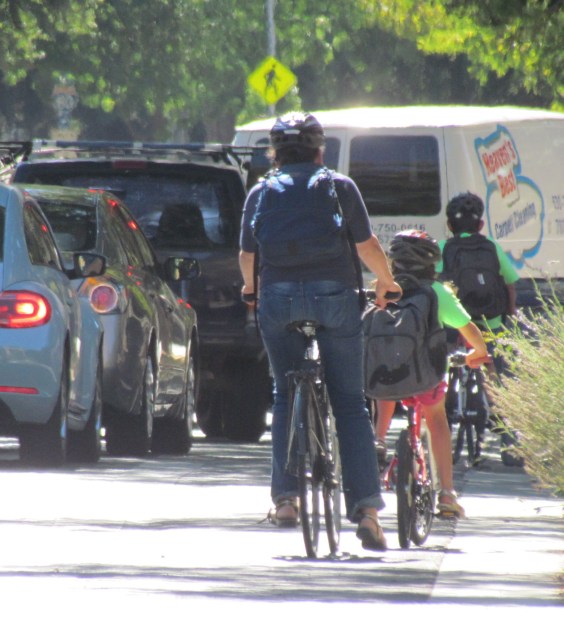Contrary to Ed Lee, Records Show No Popular Revolt Against Sunday Meters
6:31 PM PDT on March 20, 2014
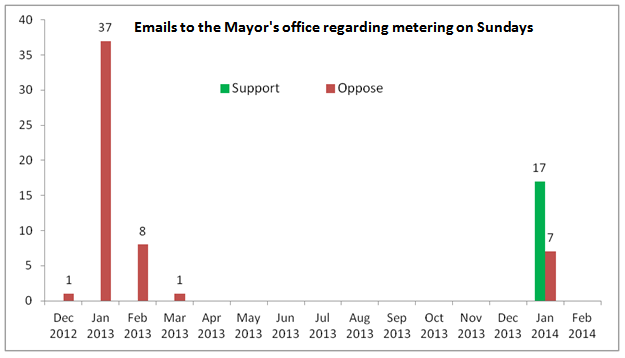
Contrary to Mayor Ed Lee's assertions that the public has revolted against Sunday parking meters, records indicate that hardly anyone has complained to City Hall about the policy via email or 311 calls.

When Lee announced his push to undo Sunday parking meters, disregarding the increased turnover and reduced traffic that metering has brought to commercial streets, he claimed that the public has complained ever since the policy was implemented.
"It hasn’t stopped, it hasn’t ended since the day the city and Muni imposed it," Lee told Bay City News in January. "People are still not used to it." At his State of the City address later that month, Lee claimed: "Nobody likes it. Not parents. Not our neighborhood small businesses. Not me."
Is this public outrage real? If Lee were really facing an endless barrage of criticism, there would be some record of it. We'd expect to find, for instance, a litany of emails decrying Sunday meters addressed to the mayor. But a public records request to the mayor's office for all emails about metered Sunday parking turned up just 54 emails protesting or supporting the policy -- most of them in January 2013, the first month the meters went into effect, followed by a handful in the next two months.
The records, furnished to Streetsblog by Ed Rosenblatt, a hardware store merchant who supports Sunday meters and filed the request, indicate that no one emailed the mayor's office about Sunday meters between March 2013 and this January, when Lee announced his push to repeal them. What's more, of the January emails, 17 were in support of keeping the parking meters, and only seven were against it. The policy is also supported by many merchants and the Chamber of Commerce since it allows more driving customers to use the limited supply of parking.
The purported Sunday meter revolt was also not evident in calls and emails to 311. According to the SFMTA's December report [PDF] on Sunday meters, 311 received just 41 calls and emails about the policy, with 23 of those in support of meters.
Of course, calls and emails aren't the only ways to complain to City Hall. But if there's really a popular revolt driving Lee's sudden push to undo smart policy, you would expect to find some trace of it in the easiest ways to lodge a complaint with the city. And there is no such trace.
There is one influential group, however, that has continued to fiercely fight Sunday parking meters -- church leaders. In fact, within a day of the mayor's announcement that he wanted to reverse Sunday metering, the SF Interfaith Council sent out an email to its members praising Lee, saying that his new position "reflects thoughtful appreciation for the broad, adverse impact of this policy."
The lobbying from church leaders certainly seems to have played a major role in the mayor's decision stop Sunday meters. The SF Examiner reported today:
Recently, Mayor Ed Lee heeded a call from religious leaders, who took issue with the SFMTA’s decision to activate parking meters at noon on Sundays.
“[The mayor] has heard a number of concerns from the interfaith community about Sunday meters and expects the [SFMTA] to consider their concerns as well as the concerns of others as they discuss the issue,” mayoral spokeswoman Christine Falvey said.
SFIC Executive Director Michael Pappas has been one of the most outspoken opponents of metered parking on Sundays, testifying at most of the City Hall hearings on the policy change in 2012, when it was adopted. I reached out to Pappas last week for an interview, and although he initially seemed happy to find a few minutes for a phone call in his busy schedule, after a couple of days he responded to my requests only by saying that he was too busy organizing "a series of events."
The SFIC has apparently been busy trying to bring back free parking, conducting a survey of religious service attendees in February on their transportation habits and ability to access and use phone apps (since a phone app is one way to use the SFMTA's pay-by-phone system for parking meters).
The survey, which the Examiner reported on today, found that among 23 congregations, 67 percent of respondents travel to worship by car, 19 percent by public transit, 2 percent by bicycle, and 12 percent walk.
In addition, 17 percent claimed to have downloaded and used the SFMTA "Pay by Phone" app, a finding which Pappas cited in an an SFIC press release to justify his contention that churchgoers cannot pay for parking. "Congregation leaders who conducted the survey credit this dramatic disparity to the reality that many congregants lack the technical aptitude to download and utilize applications," he said.
Pappas and other church leaders have never acknowledged the benefits of metered parking, which increases turnover at high-demand parking spaces so that more drivers, including those headed to churches, can find a spot quickly instead of having to circle around and clog up the streets. Instead, Pappas' statement frames Sunday parking metering only as a way to collect revenue for Muni:
The interfaith community wholeheartedly supports multimodal transportation, biking, walking and taking transit to worship services. The ethical question for the SFMTA, raised by these findings, is whether the agency's strategy for budget balancing should be based on technological barriers and the resulting parking tickets issued. That just doesn't seem right or fair.
The most bizarre aspect of this whole saga, however, is that the vast majority of places of worship in San Francisco are surrounded by unmetered parking spaces, which means Sunday meters don't have a direct bearing on most of the SFIC's membership. We analyzed parking spaces within a quarter-mile of the 668 religious institutions in San Francisco, and found that for 53 percent of them, less than 10 percent (if any) of the spaces within that distance were metered. Another 16 percent had 10 to 20 percent of spaces metered, and only 4 percent were surrounded by 100 percent metered spaces.
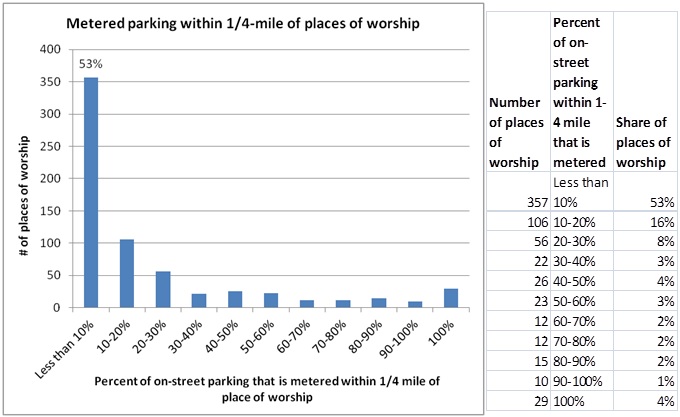
That raises the question of whether the faith leaders' fight is really against feeding meters, or the threat the policy poses to the SFMTA's practice of turning a blind eye to rampant illegal parking by churchgoers on Sundays. At a supervisors hearing on double parking in October, Reverend Arnold Townsend, another outspoken proponent of free Sunday parking, urged city officials to continue looking the other way, despite the problems it causes (today's Examiner article described a reverend's weekly ritual of collecting angry notes left on the cars of his congregation members who park in the bike lane at Golden Gate and Masonic Avenues).
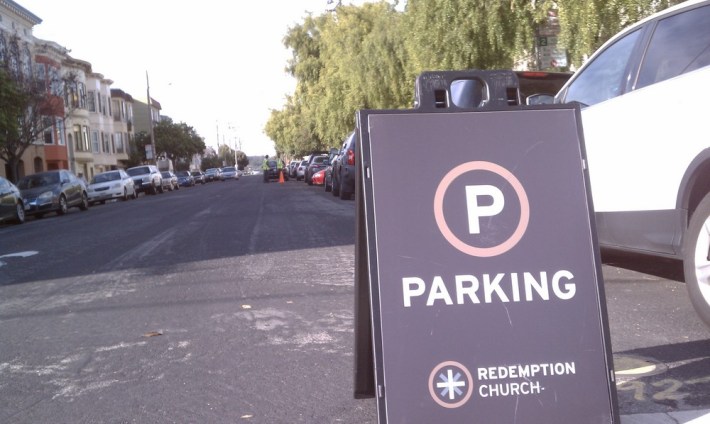
In response, Lea Millitello, a former SFPD lieutenant who was then the SFMTA’s director of security, investigations, and enforcement (since retired), promised that the agency won’t go after double-parking for church, calling the Sunday exemption "part of San Francisco’s history."
The underlying motivation may also be related to the desire to simply not have to think about parking tickets. According to the SFMTA, Sunday parking meter citations have been slowly declining as drivers get used to the policy, but the citation rate is still higher than normal. According to an agency report from last week [PDF], the rate of citations as a proportion of meter revenue on Sundays was at 35 percent in December, down from the peak of 48 percent in February (note that most of the complaint emails were sent the month before, which indicates they weren't necessarily a response to citations). For all seven days of the week, the rate was 24 percent in December, though it varies, running as high as 34 percent last March.
"It's definitely worrying that the citation rate hasn't come down more on Sundays," said Cheryl Brinkman, vice chair of the SFMTA Board of Directors, who noted that drivers tend to get fewer tickets when the SFMTA installs modern meters which accept multiple forms of payment, even allowing pre-payment before Sunday enforcement begins at noon. "I don't know if we need better signage, or if the citation rates are higher at the old meters. I do know that our data has shown that when we put the new meters in place, the citation rate really goes down."
The data also clearly shows the benefits that Sunday parking metering has brought. The SFMTA found that in 2013, the average time drivers took to find a parking spot during Sunday meter hours was cut in half, from four minutes to less than two. Turnover increased by at least 20 percent, meaning that more customers were using the same amount of parking spaces.
Rosenblatt, the manager of Ace Hardware on Clement Street in the Inner Richmond who filed the records request, estimates that Sunday meters increased his business by 15 to 20 percent last year. "Sunday turned into one of our busiest days," he said.
The repeal of Sunday parking meters, which could cost the SFMTA up to $10 million in revenue, will be up for consideration in the agency's budget in April by the SFMTA Board of Directors, which is appointed by the mayor.
Stay in touch
Sign up for our free newsletter
More from Streetsblog San Francisco
Streetsblog SF editor Roger Rudick offers constructive criticism of Chicago’s downtown bike network
"There were blocks that felt very safe and very secure," he said. "But then you're immediately – voom! – disgorged into three lanes of moving traffic with no protection."
Commentary: There is Zero Ambiguity to the West Portal Tragedy
What happened in West Portal was entirely predictable and preventable. The city must now close Ulloa to through traffic and make sure it can never happen again
